View all Standards for Texas Essential Knowledge and Skills for Theatre Arts
C.1.G develop and model memorization skills.
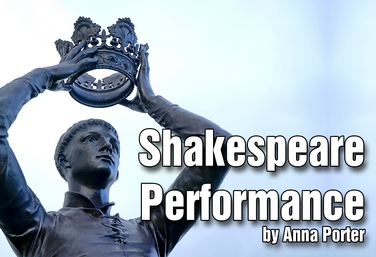
UNIT
Shakespeare Performance
by Anna Porter
In this unit by Anna Porter, students are introduced to the works of Shakespeare and explore how to bring a character to life in a monologue performance. Students are also introduced to the tools to help them unlock meaning in Shakespeare’s text. Through this eleven lesson series, students will participate in class discussions, activities and performance. Assessment tools include informal assessment, submission of textual analysis work and a final performance.
Read More
about Shakespeare Performance
Read Less
about Shakespeare Performance
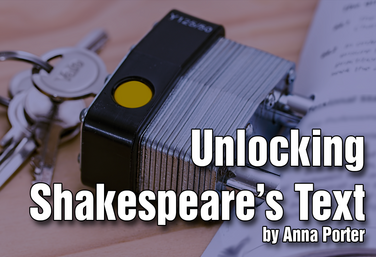
UNIT
Unlocking Shakespeare's Text
by Anna Porter
Shakespeare’s text holds valuable tools that students can use to unlock and understand meaning. In this unit by Anna Porter, students explore how to use the tools of research, context, textual analysis, imagery and punctuation to help them unlock meaning in Shakespeare’s text. This unit is created for an Intermediate to Advanced drama class with a basic background in plot structure and acting technique.
Through this five lesson series, students will use journals, participate in class discussions, activities and performance to explore the tools used to unlock a text. Assessment tools include informal assessment as well as a final group presentation and performance.
Read More
about Unlocking Shakespeare's Text
Read Less
about Unlocking Shakespeare's Text
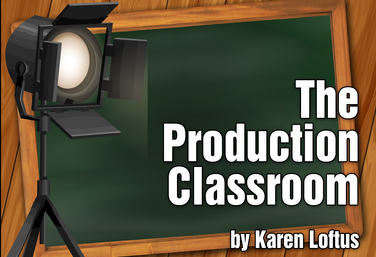
UNIT
Part of the Production Classroom Units Curriculum
Production Classroom Units Overview
by Karen Loftus
The overview lays out the all of the parts of The Production Classroom Units - which is divided into three parts.
In Part One, you’ll take your students through a series of pre-production units designed to help students gain as much comprehension as possible about putting on a successful production.
Part Two offers articles on each step in the process, samples and forms, a suggested pacing, role definitions and task checklists, an outline for a typical class, as well as performance duties. This section also outlines the assessment piece for The Production Classroom – the production binder.
Part Three provides a Post-Performance Reflection. Unpack the experience with students, reflect back on what went right and what could be changed for next time. A written Reflection is included as well as a Rubric for student production binders.
Read More
about Production Classroom Units Overview
Read Less
about Production Classroom Units Overview

UNIT
Part of the Production Classroom Units Curriculum
Part One - Pre-Production
by Karen Loftus
In Part One of The Production Classroom, you’ll take your students through a series of pre-production units designed to help students gain as much comprehension as possible about putting on a successful production.
Read More
about Part One - Pre-Production
Read Less
about Part One - Pre-Production

UNIT
Part of the Production Classroom Units Curriculum
Part Two - Rehearsal and Performance
by Karen Loftus
Part Two offers articles on each step in the process, samples and forms, a suggested pacing, role definitions and task checklists, an outline for a typical class, as well as performance duties. This section also outlines the assessment piece for The Production Classroom – the production binder.
Read More
about Part Two - Rehearsal and Performance
Read Less
about Part Two - Rehearsal and Performance

UNIT
Part of the Production Classroom Units Curriculum
Part Two - Documents
by Karen Loftus
This section provides samples and worksheets for actor forms, costume department, general binder, lighting and sound, marketing samples, scenic and prop samples, and stage management and production manager samples and forms.
Read More
about Part Two - Documents
Read Less
about Part Two - Documents

UNIT
Part of the Production Classroom Units Curriculum
Part Three - Reflection and Assessment
by Karen Loftus
Part Three provides a Post-Performance Reflection. Unpack the experience with students, reflect back on what went right and what could be changed for next time. A written Reflection is included as well as a Rubric for student production binders.
Read More
about Part Three - Reflection and Assessment
Read Less
about Part Three - Reflection and Assessment
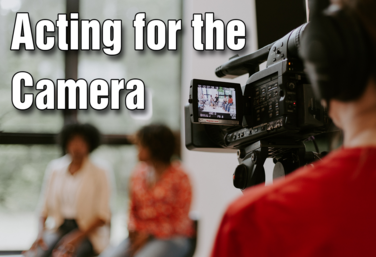
UNIT
Acting for the Camera
by Ruthie Tutterow
The purpose of this unit is for students to know the differences and practice skills for film versus stage acting. They should also know the basic vocabulary of acting for the camera. It will also be helpful for them to get practice in editing. By seeing both sides of the camera, they will gain valuable experience in seeing what works from both the producing and acting side. Students will be able to see and reflect on their work.
Read More
about Acting for the Camera
Read Less
about Acting for the Camera
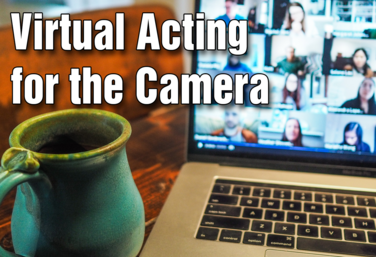
UNIT
Virtual Acting for the Camera
by Ruthie Tutterow
The unit is adapted for a virtual environment.
The purpose of this unit is for students to know the differences and practice skills for film versus stage acting. They should also know the basic vocabulary of acting for the camera. It will also be helpful for them to get practice in editing. By seeing both sides of the camera, they will gain valuable experience in seeing what works from both the producing and acting side. Students will be able to see and reflect on their work.
Read More
about Virtual Acting for the Camera
Read Less
about Virtual Acting for the Camera

UNIT
Decolonizing Monologues
by Nicholas Pappas
In this unit, students will write a monologue authentic to their unique voice rather than to a Eurocentric canon model. We are going to decolonize the monologue. The goal in decolonizing monologues is to be inclusive of all voices in the classroom and to allow those voices to grow out of the unique style and cultural background of every student.
Read More
about Decolonizing Monologues
Read Less
about Decolonizing Monologues

UNIT
Spoken Word Poetry
by Quincy Young
In this unit, students will create a performance of a spoken word poem designed to engage, entertain, and affect an audience. They will also write a poet’s statement in which they describe the purpose(s) or inspiration(s) of their poetry.
This is not a technical writing unit and is geared more toward students self-expression and engaging an audience. If your students are not skilled poets, this unit is still accessible.
Read More
about Spoken Word Poetry
Read Less
about Spoken Word Poetry

PD COURSE
The Production Classroom
by Karen Loftus
In The Production Classroom, instructor Karen Loftus will show you how to explore ways that you can produce shows during your regular class time. The course gives you a series of exercises and reflections that help you determine everything, from the type of show you may want to do, to the way you can divide up your class and responsibilities, to specific assignments that will keep your students engaged and focused.
The Production Classroom is the ultimate in project-based learning. Students learn to work collaboratively while setting goals and working towards a successful finished project. The course includes exercises and strategies to use with students to help assure their success in the production. Multiple examples and anecdotes help you to envision what the production classroom could look like in your room, performance space or theatre.
Read More
about The Production Classroom
Read Less
about The Production Classroom

PD COURSE
21st Century Skills Through Devising
by Allison Williams
Allison Williams leads the course: 21st Century Skills Through Devising. This course covers what devising is, why to do it, how to do it, and how your students can master the 21st Century Skills of collaborations and cooperation, critical thinking, creative thinking through devising.
High school is a great place to try devising with your students. But it’s not something you want to throw at your students without any preparation. Framework is important and this course takes you through a number of exercises you can take into the classroom tomorrow to help build a place of physical safety, a place where students work at making a lot of choices instead of waiting for the perfect choice, and a place where students feel comfortable making creative choices. The material also reviews the process of putting together a show from the idea/research stage to editing, to giving feedback.
Your students have what it takes to create their own material, collaborate with each other, and have a unique theatrical experience!
Read More
about 21st Century Skills Through Devising
Read Less
about 21st Century Skills Through Devising
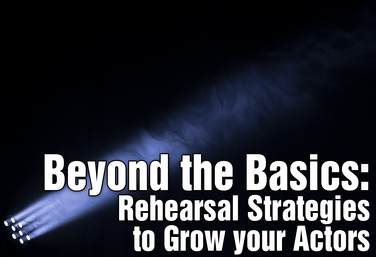
PD COURSE
Beyond the Basics: Rehearsal Strategies to Grow Your Actors
by Julie Hartley
The focus of the teacher-director should be not only on the quality of the show, but on the value of the experience offered to student actors. This course takes you on this journey through practical rehearsal strategies that apply an ensemble approach.
This course starts with those all important first rehearsals, explores warm ups, and looks at character development. We examine specific types of plays, like classical texts and comedy, and conclude with strategies to solve common rehearsal problems.
Go beyond the basics!
Read More
about Beyond the Basics: Rehearsal Strategies to Grow Your Actors
Read Less
about Beyond the Basics: Rehearsal Strategies to Grow Your Actors
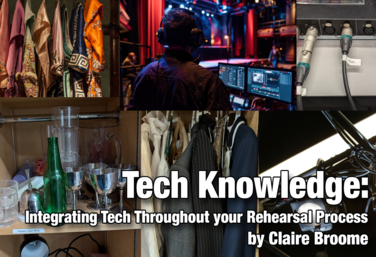
PD COURSE
Tech Knowledge: Integrating Tech Throughout Your Rehearsal Process
by Claire Broome
This course will help you integrate technical theatre earlier in the creative process to help reduce the stress of tech week, and make sure you have what you need before choosing a show. We will explore how to include your technical theatre team from day one and will help you have an easier experience throughout the rehearsal process and final performances.
Read More
about Tech Knowledge: Integrating Tech Throughout Your Rehearsal Process
Read Less
about Tech Knowledge: Integrating Tech Throughout Your Rehearsal Process
View all Standards for Texas Essential Knowledge and Skills for Theatre Arts Standards Master List